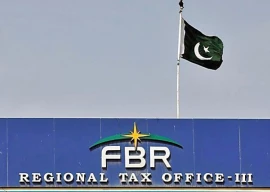
Pakistan's new civil-military task force on tax matters may find it challenging to implement a practical solution to the persistent multi-billion-dollar discrepancy in bilateral trade due to Beijing's reluctance to share transaction-wise data, it has emerged.
In its maiden meeting held two days ago, the Prime Minister's Task Force on Digitalisation of the Federal Board of Revenue (FBR) did not discuss in depth the issue of access to transaction-wise Chinese trade data, multiple sources confirmed to The Express Tribune.
The chairman of the task force advised that instead of just focusing on China, the members should discuss the matter in general without mentioning specific countries.
The chairman of the task force, Ali Pervaiz Malik, the Minister of State for Revenue, told The Express Tribune that the matter would be discussed in detail in the next meeting once more information is available. Tania Aidrus has been appointed convener of the working group on trade data sharing, tasked with providing specific recommendations at the next meeting, said Malik.
A key term of reference for the Task Force on Digitalisation of the FBR is the "trade data sharing interface with trading partners for effective valuation and appraisal."
China is sensitive to any demand for access to detailed goods-declaration data due to concerns expressed by trading partners about dumping goods and their misdeclaration to penetrate markets and evade duties.
Pakistan has long been requesting goods-declaration data from Chinese authorities, but they have only been sharing data in a lump sum, Zeba Hai, former Member of Customs Operations of the FBR, told a parliamentary committee last year.
Pakistan and China have a free trade agreement and have signed various protocols for data sharing, but these have not been fully implemented.
At present, China is sharing data for goods covered under the bilateral Free Trade Agreement (FTA), which accounts for only one-third of the total imports from China, according to Customs officials.
About 10 months ago, former Chairman FBR Malik Amjad Zubair Tiwana briefed the Senate Standing Committee on Finance regarding an ongoing investigation into a discrepancy of $8 billion between trade figures reported by four trading nations to the International Trade Centre (ITC) and Pakistan's own statistics.
The then-FBR chairman explained that China reported exports of $17 billion to Pakistan to the ITC, while Pakistani data showed $13 billion in imports, indicating a $4 billion gap.
However, the Pakistan Business Council wrote to the then-caretaker Finance Minister Shamshad Akhtar, claiming that Pakistani traders reported imports from China, Singapore, Germany, and the United Kingdom at nearly $19 billion in 2022. But the four trading partners reported exports of $26.3 billion to Pakistan in the same year, indicating a disparity of $7.5 billion.
Pakistani authorities assert that the discrepancy is not as high as reported, due to Chinese imports to Afghanistan via Pakistan being counted as Pakistani imports. The estimated figure for Afghanistan-bound imports was around $3 billion. Additionally, there were defence imports that are not classified, though the quantum was not known, according to Pakistani authorities.
Attempts to secure transaction-wise data access were also made during the PTI government, but Beijing rebuffed such calls. However, Pakistan is not unique in having trade data-related discrepancies; such variations are also found in the bilateral trade of other countries.
During negotiations for the second phase of the FTA, Beijing threatened to pull out when Pakistan asked for complete access to import data. The 2013-18 PML-N government was reluctant to sign the second phase of the FTA. The then-Commerce Minister, the late Pervaiz Malikfather of Ali Pervaizopposed signing the expanded deal with China due to its adverse implications for Pakistani businesses.
But the PTI government entered into the second phase of the FTA without securing the right to obtain valuation-based transaction-wise trade data.
An official handout by the FBR stated that the task force had a detailed discussion on Terms of Reference (TORs), which included data sharing both vertically with the provinces and horizontally across ministries, supply chain automation, Track & Trace System through an integrated system, restructuring of PRAL, and trade data sharing interface with trading partners.
During the meeting, the new chairman of the FBR opined that non-filers should be put behind bars to promote a culture of tax compliance in Pakistan. He was not impressed with the presentation by McKinsey, the consultancy firm hired for the digitalisation of the FBR.
McKinsey has been hired for the overall digitisation of the FBR, but its focus is now more on "quick wins," which it claims can be achieved by utilising the existing FBR database.
Asif Peer from Systems Ltd and a member of the task force may take on a more proactive role in the digitization efforts, including the revamping of Pakistan Revenue Automation Limited.
The co-chairman of the Task Force, Major General Syed Ali Raz, stated that the end goal of the government's reform agenda was to increase the country's tax-to-GDP ratio for enhanced revenue generation. Major General Raz emphasised the importance of focusing on implementing the various initiatives to achieve fruitful results.












1723024092-0/BeFunky-collage]___-(8)1723024092-0-270x192.webp)






COMMENTS
Comments are moderated and generally will be posted if they are on-topic and not abusive.
For more information, please see our Comments FAQ